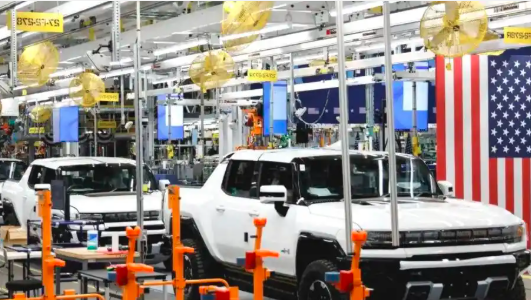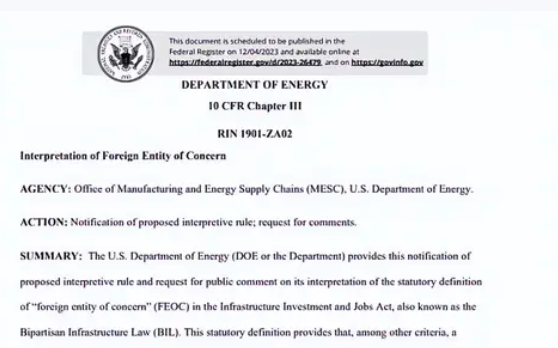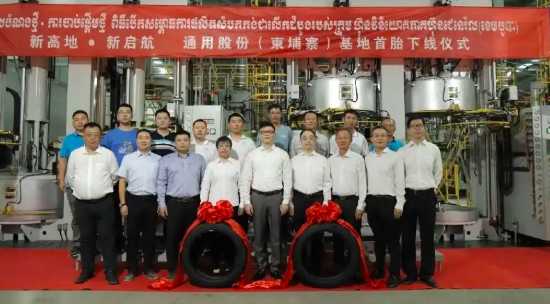Amid the "Decoupling from China" Turmoil in American Auto Companies' Supply Chain, Is There Really an Impact on Domestic Plastics Enterprises?
Specialized Plastic Vision2025 translates to "2025" in English.NovemberOn the 18th, it was observed thatRecently, Tesla issued a formal notice to its U.S. factory suppliers, requesting that in the future...Gradually replace all Chinese-made components within 1-2 years, covering multiple core areas including battery components, electronic control units, and structural parts.
Before this, General Motors also issued a statement to global suppliers.The "decoupling" timeline requires a comprehensive adjustment of the supply chain in the North American market to be completed before 2027. This supply chain reconstruction, driven by policy compliance, appears to be an autonomous action by enterprises, but it actually implies a deeper logic of geopolitical competition and industrial policy orientation.

Source: U.S. Department of State
Policy compliance and risk hedging in the context of going to China."inevitability"
Specialized Vision According to the U.S. Department of the TreasuryThe revised provisions of the Inflation Reduction Act in 2024 reveal that starting in 2025, electric vehicles using battery components from "Foreign Entities of Concern" (FEOC) will not be eligible for the $7,500 federal tax credit. Additionally, the new "Connected Vehicle" safety regulations from the Department of Commerce, effective January 2025, explicitly require that after 2027, smart driving software associated with China will be prohibited, and after 2030, related hardware will also be banned. These two policies create dual pressure, forcing automakers to eliminate Chinese elements from their supply chains.
Tesla and General MotorsThe "decoupling" decision is essentially a risk hedging strategy under the guidance of policy compliance. Firstly, the localization subsidy rules in the IRA Act create rigid constraints. Taking the Tesla Model Y as an example, its North American version must meet strict criteria: 90% of battery components must be produced in North America, and 50% of critical minerals must be sourced from North America or allied countries; otherwise, it will lose tax credit eligibility. In 2024, over 60% of Tesla's sales in the North American market rely on federal subsidies to maintain competitiveness, and this policy lever directly forces supply chain adjustments.

Source of the image: Dongchedi
Secondly, fluctuations in tariff policies increase uncertainty.In 2025, the U.S. will increase the tariff rate on Chinese auto parts from 25% to 30%, and with the "stacked levy" rule, the comprehensive tax rate for some parts will exceed 40%. Although there are phased exemptions, companies find it difficult to withstand the risk of long-term policy fluctuations. Thirdly, the new "connected cars" regulations will extend supply chain security reviews from software to hardware, involving cameras, radars, sensors, and other plastic components, requiring traceability to the raw materials stage, further escalating compliance costs.
However, the supply chain adjustment faces practical difficulties. Tesla's Shanghai factory.In 2024, the production volume will reach 916,000 units, accounting for over 50% of its global capacity, and will serve as a hub for exports to Europe and the Asia-Pacific region. If the U.S. production lines forcibly pursue "decoupling from China," they will face a shortage of battery material supply—China controls 70% of global lithium salt processing and 85% of phosphoric iron lithium cathode material capacity. Although LG Energy's LFP production line in Michigan has already been put into operation, its production scale and cost control still struggle to compete with the Chinese supply chain.
Does it have an impact on domestic plastic enterprises?
For domestic plastic enterprises, the actual impact of the supply chain adjustments by American car manufacturers is much smaller than the market expected. The core logic lies in the complexity of plastic applications in automobiles and the resilience of supply chain reconstruction.
From the perspective of high-performance plastics, engineering plastics and special engineering plastics are mainly used in high-tech density fields such as electric drive systems and intelligent driving modules. Leading domestic companies such as Kingfa Science & Technology and Nanjing Julong primarily serve domestic OEMs, including Tesla's Shanghai factory.In 2024, most of the engineering plastics used in the Model 3/Y produced at Tesla's Shanghai factory are supplied by domestic suppliers, and this supply is not affected by U.S. policies. Even if some components are exported to the United States, "localized production + local supply" can be achieved through bases in Mexico and Southeast Asia to avoid FEOC scrutiny.
Although the general plastics sector involves some export items, the domestic supply chain going overseas has already formed an effective hedge. For example, in the case of tire molds, Haomai Technology's new establishment in Cambodia...With an annual production capacity of 1,500 units, directly supporting the production bases of Chinese tire companies in Southeast Asia, the products are ultimately sold to the U.S. market after completing "Chinese technology + Southeast Asian manufacturing" compliance modifications. The expansion project of Jinma Rubber at Port Klang, Malaysia, achieves zero-tariff exports through ASEAN Free Trade Area rules, and its production of modified plastic materials continues to increase its market share in North America.

Image source: Haomai Technology
The more profound change lies in the innovation of supply chain organization models. Domestic plastic companies throughThe "overseas factory building + localized production" model involves relocating the entire chain of raw material processing, product forming, and assembly integration overseas. For example, Nanjing Julong is constructing a modified plastics factory in Mexico, focusing on producing high-end products such as LCP and carbon fiber reinforced composites, directly connecting to the North American new energy vehicle industry chain. This "supply chain going overseas" model not only avoids trade barriers but also achieves precise alignment with technical standards and market demands.
The necessity of going abroad: from passive response to proactive layout.
The current trend of domestic plastic enterprises going overseas has shifted from the early stage of"Capacity transfer" has upgraded to "strategic layout." Jinhfa Technology has established 18 production bases in 10 countries, including Germany, the United States, and Vietnam, with overseas revenue accounting for 16.56% by 2024. The modified plastics produced at its North American base have entered the global procurement system of Ford and General Motors. Lianlong's investment of 820 million Malaysian Ringgit in Johor, Malaysia, focuses on the production of aging-resistant additives for polymer materials, with products not only meeting the demands of the Southeast Asian market but also radiating to the European and American markets through the Singapore hub.
The logic behind this layout is clear: firstly, to avoid trade barriers. By establishing factories overseas, enterprises can benefit from host countries' free trade agreements, tax incentives, and other policies to reduce overall costs. For example, the Cambodia project can enjoy the European Union..."Tax-free treatment except for weapons," products exported to Europe are exempt from tariffs. Secondly, proximity to target markets. The Mexican base can cater to the North American market with a 24-hour rapid response; the Southeast Asian base covers the 10 ASEAN countries, meeting localized demands. Thirdly, enhancing supply chain resilience. Through multi-regional capacity layout, enterprises can disperse geopolitical risks, avoiding the impact of fluctuations in a single market.
The deeper strategic significance lies in the output of technical standards. Domestic plastic enterprises have formed technological advantages in areas such as engineering plastic modification and the synthesis of special engineering plastics. By establishing factories overseas, they can export Chinese standards and Chinese processes to the world, promoting the transition from"Product going abroad" has upgraded to "technology going abroad." For example, Jifa Technology has established a research and development center in Germany, which has taken the lead in formulating the EU's engineering plastic recycling standards. Its research and development of bio-based engineering plastics has seen a continuous increase in market share in Europe.
Epilogue:
Tesla and General MotorsThe "decoupling" action is essentially a supply chain restructuring under geopolitical competition. For domestic plastic enterprises, this restructuring brings both challenges and opportunities. In the short term, some export-oriented companies may face pressure from order adjustments, but by going abroad with their supply chains and localizing production, they can effectively hedge against policy risks. In the long term, China's plastic industry has formed a complete technical system and capacity advantage. Through a "technology + capacity" dual outbound model, it can occupy a more advantageous position in the global industrial chain restructuring.
The core insight of this supply chain transformation is that during the period of globalization retreat, companies need to..."Passive adaptation" shifts to "proactive planning." By building a multi-regional, multi-level capacity network, the transition from "Made in China, sold globally" to "Produced globally, sold globally" is achieved. This is not only a practical choice to address current policy risks but also a strategic move to position for future industry competition. For domestic plastic companies, accelerating overseas expansion is not an optional question but a mandatory one—to find new balance in reconstruction and to explore new spaces in transformation.
【Copyright and Disclaimer】This article is the property of PlastMatch. For business cooperation, media interviews, article reprints, or suggestions, please call the PlastMatch customer service hotline at +86-18030158354 or via email at service@zhuansushijie.com. The information and data provided by PlastMatch are for reference only and do not constitute direct advice for client decision-making. Any decisions made by clients based on such information and data, and all resulting direct or indirect losses and legal consequences, shall be borne by the clients themselves and are unrelated to PlastMatch. Unauthorized reprinting is strictly prohibited.
Most Popular
-

Zf asia-pacific innovation day: Multiple Cutting-Edge Technologies Launch, Leading Intelligent Electric Mobility
-

Fire at Sinopec Quanzhou Petrochemical Company: 7 Injured
-

DuPont plans to sell Nomex and Kevlar brands for $2 billion! Covestro Declares Force Majeure on TDI / oTDA-based / Polyether Polyol; GAC Group Enters UK Market
-

List Released! Mexico Announces 50% Tariff On 1,371 China Product Categories
-

Engel initiates 10+ eu anti-dumping complaints seeking trade protection for pvc, abs, polyolefins and other products






